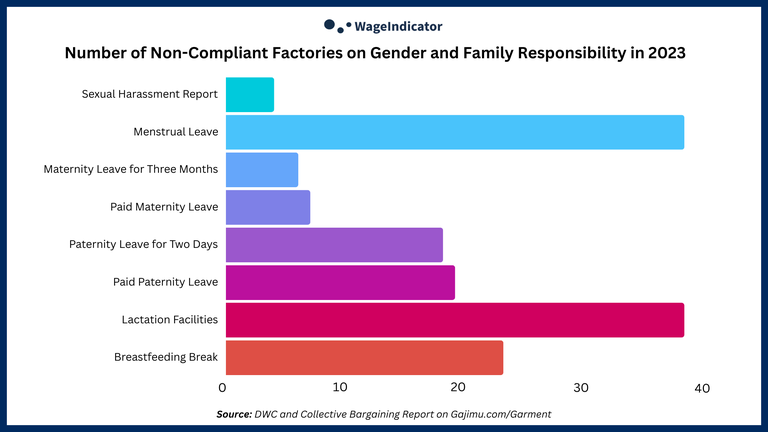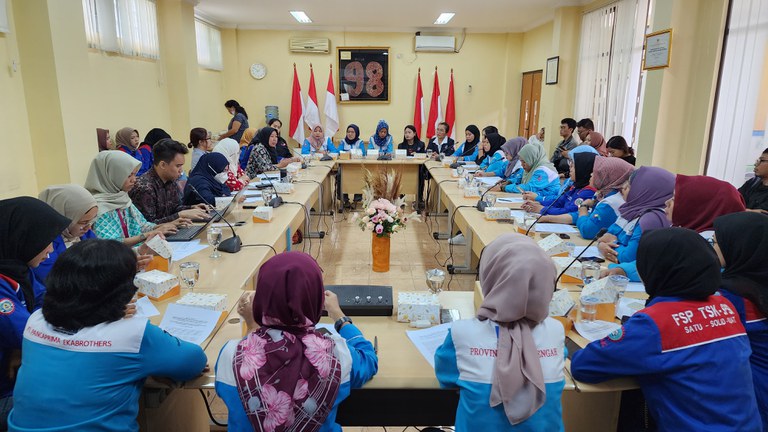On the morning of November 27, 2023, Nurul Huda, along with 27 female* representatives from factory-level trade unions in the textile, garment, and footwear sectors visited the National Commission on Violence Against Women (Komnas Perempuan).
They came from four regions in Indonesia - DKI Jakarta, Banten, West Java, and Central Java - bearing a collective statement on gender-based violence in their industry. They presented this statement to the National Human Rights Institution (established in 1998) following two days of intense discussion facilitated by the Makin Terang Program that was specifically designed for female union leaders in the "Women Workers Academy".
This Academy gave these women tools to critically examine injustices in the workplace which predominantly affected female workers, such as through compliance checks. These issues female workers face range from pay gap and job promotions to tax deductions, difficulties in obtaining union leave compared to male workers, sexual violence, and violations of women's reproductive rights.
Ironically, the garment industry in Indonesia is dominated by women workers. The Clean Clothes Campaign estimates that they make up 80% of the workforce. Despite this, as the International Labour Organisation has noted, they are at a higher risk of suffering physical and emotional safety issues, as well as inequalities in wage and career advancement.
Through their discussions, Nurul Huda and her colleagues identified four forms of gender-based violence to focus on: discrimination, violations of reproductive health and maternity rights, harassment and violence, and economic violence.
They based their findings on data from the 2023 DecentWorkCheck survey, which covered 100 factories and 3,065 respondents, including the factories in which they work themselves. The survey addressed eight key topics related to gender-based violence in the workplace: sexual harassment, menstrual leave, maternity leave, full wages during maternity leave, paternity leave (for male workers whose wives give birth or experience miscarriage), full wages during paternity leave, lactation rooms, and breastfeeding breaks.

At Komnas Perempuan, Nurul Huda and her team were accompanied by Gajimu and TURC teams and were warmly received by Satyatanti Mashudi, Commissioner and Chair of the Women's Workers Team, as well as staff responsible for receiving complaints at Komnas Perempuan.
As the spokesperson, Nurul Huda explained their visit's purpose and read their collective statement. The concrete data they presented added gravity, such as the fact that 1 in 20 respondents to the DWC survey face workplace sexual harassment, almost 1/3rd of all factories do not provide menstrual leave, 5-6% of factories do not pay full wages during maternity or paternity leave, and that 1/4th of all factories do not provide breastfeeding facilities.
Other participants shared their personal experiences of gender injustice in the workplace and discussed the efforts and strategies they had undertaken as union leaders, as well as the external and structural challenges they faced beyond their control.
They also presented eight recommendations for Komnas Perempuan and other stakeholders to implement. These included improved maternity and paternity leave durations, stricter regulation of pregnant women undertaking hazardous tasks, easier availability of menstrual leave, and immediate ratification and implementation of the ILO Convention 190 on the elimination of harassment and violence at the workplace among others.
In response, Komnas Perempuan expressed its appreciation to the participants for their efforts in defending women's rights in the workplace. The data collected from these factories was deemed valuable and would be included as National data in the Annual Report (CATAHU) of Komnas Perempuan. Since 2001, CATAHU has been the only National data compilation on gender-based violence against women in Indonesia.
Following this commitment, on March 7, 2024, a day before International Women's Day, Komnas Perempuan launched the CATAHU, featuring the results of the 2023 DecentWork Check survey from the Makin Terang Program as an additional data source.
Citra Adelina, a member of the Sub-Commission for Monitoring, which coordinates the writing of CATAHU, remarked, "This specific issue data will support Komnas Perempuan's analysis that gender-based violence in the workplace is still prevalent."
But the DWC survey’s impact doesn't stop there. The Women's Workers Team (TPP), an ad hoc team formed by Komnas Perempuan to address women's labour issues, began using the Makin Terang data for two key purposes.
First, TPP has included the maternity rights survey data in an independent report for the Beijing Declaration and Platform for Action (BPfA), the most important global agenda and policy document on gender equality. Being held every fifteen years, the BPfA is now adopted by 189 countries. All States are urged to conduct national reviews of progress and challenges in implementing the Beijing Declaration and Platform for Action.
Fatma Susanti, a member of TPP, explained, "Aside from CATAHU, Komnas Perempuan doesn't have large-scale data to recap the implementation of maternity rights. I was searching for it, and then the survey data from the Gajimu team came in."
Second, the Makin Terang data has been included in the Terms of Reference for monitoring maternity rights following the Omnibus Law in the Civil Servant, Private, and Stated-Owned sectors, which Komnas Perempuan will conduct throughout this year.
Santi hopes that this crucial data will become a national dataset that accurately represents violence against female workers. She believes the Makin Terang data has great potential to become national data by expanding the coverage area, dimensions of workplace violence, and the range of industrial sectors.
"I envision this as a dream for Komnas Perempuan to have national data or reports," she asserted.
*We recognize that gender-based violence affects all gender identities. This story focuses on female workers as a deliberate choice to address their specific challenges.
 Photo: The female union representatives visited Komnas Perempuan office
Photo: The female union representatives visited Komnas Perempuan office
